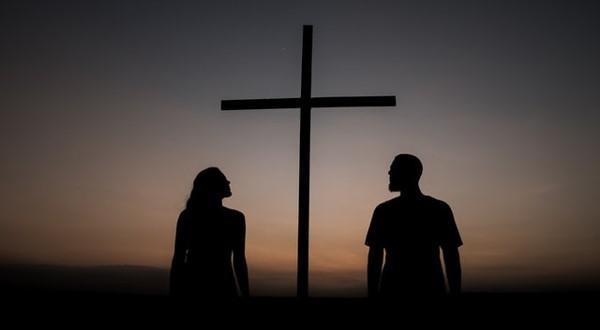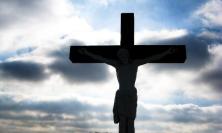‘There are so many silences that run through the great narrative of Holy Week and they all flow into the long silence of the Father from Gethsemane to Easter morning’, writes James Hanvey SJ. It is tempting to interpret this silence as an absence or a space to fill, in the gospel narratives and in our own lives, but instead we should explore, embrace and allow ourselves to be changed by it.
The silences in our lives and relationships are often significant. There are those silences that are filled with security and peace. Even in the midst of a frenetic world or schedule, we can still carry an inner silence – a sort of interior poise. At times, silence can be a sort of ‘at homeness’ with others: there is a familiarity that does not need to speak; the silence itself is a means of communicating and knowing. This is not an exhausted silence, but one that comes after a long time of being together, of knowing each other in and through the textured experiences of our lives. It can take a lot of work, a lot of attention and sometimes painful mis-readings before we come to co-habit silence and discover that it is now grace rather than exhaustion or a temporary truce, and certainly not a threat or a weapon. We know, too, those long silences of absence and waiting, sometimes in hope and sometimes in dread, and the silences that are not really silences because they are filled with presences and voices, all the conversations we carry within us.
Silence is not so much the absence of noise; it is what lies under the noise. When we experience the rapt silence after a song or a recital, we know that something has been given to us. The silence afterwards is shaped by the music and, in a strange way, the music itself is more than just memory. Neither is it just repetition; it still has a living voice, for even when it has stopped the music does not end. In this way, silence is a gift that allows the music to continue living in us.
There are so many silences that run through the great narrative of Holy Week and they all flow into the long silence of the Father from Gethsemane to Easter morning.
Silence in a ‘saturated time’
The last days of Jesus in Jerusalem have their own extraordinary rhythm and vividness. There is the bustle of the crowds and the bulging life of the sacred city as it makes its preparations for the solemnity of the Passover. The air is shot through with tension and expectation. With a subtle economy of voice, the gospels draw us in to the complex drama that unfolds. They invite us to attend to the different levels of the way in which God’s plan unfolds within human actions. Simultaneously, they reveal the contingency of human history and the illusions of those who believe they control it, against the cantus firmus of salvation history. In creating the interweaving flow of these dimensions, the gospel narratives quietly change us: we, the readers, also become the witnesses. We are given an understanding of the moment which can, in fact, only come after it when all is known. Thus, from this place of knowing, we enter the narratives; the time of the gospels is always an illuminated or contemplative time. There is more at work here than the technique of an omniscient authorial voice. In a sense the gospels are always in an ‘Easter time’, a feature not sufficiently attended to by exegetes. This does not detract or diminish their historical veracity, it saturates it. In their own way, they teach us something about history itself; indeed, about the moments of our own lives and the multiple dimensions that even our most mundane events contain.
The silence of the God who speaks
If the gospel narratives of Jesus’s last days are saturated with a graced knowledge, they are also filled with a strange and perplexing silence. It is a silence that only heightens the loneliness and fragility of Jesus; it amplifies his testimony and his cry from the cross, but does not answer it. It is the silence of God, the silence of the Father; it is the silence that opens up the possibility that maybe God is indeed an empty illusion, powerless before the vast abyss of calamity and suffering. It is part of the truthfulness of the gospels, indeed, of all scripture, that they never disguise or explain away the silences of God. This is all the more remarkable because the God who is revealed in scripture is, from the very first moment, a God who speaks out of the silence, whose word calls the world into being. Even before the revolutionary first commandment, which proclaims the transcendent truth that there is only God, comes the necessary prior command, ‘to hear’ – Sh’ma Israel. ‘To hear’ not only establishes a relationship, it goes beyond expression and points towards the realm of God’s ineffable life. It enters into a silence which is not absence but the fullness of presence. Yet, when spoken in time, it always hovers in ambiguity: is this silence an absence or presence? Is it concealment or disclosure? In the passion and crucifixion of Jesus, this ambiguity is radicalised.
From intimacy to silence in the garden
The gospel narratives of these last days relocate us. We move from being members of the crowd – hearing his teaching, watching his actions, puzzled by and expectant of the kingdom that he announces – to his inner circle. As events grow to their strange climax, so too does our intimacy with Jesus. Moments take on significance and density, even more vivid and present when recalled and relived in the community’s anamnesis – the ‘saturated time’ which the Spirit gives. In the meal at Bethany, the darkness of betrayal surfaces around Mary’s silent, beautiful and prophetic action, both a messianic anointing and a preparation for death. The final meal in the upper room not only interprets the self-gift of Jesus in the historical moment, but is the act that interprets all God’s eucharistic love sealed on the cross for all time. In each of these events Jesus is at the centre. They leave us in no doubt about his intimacy with the Father and his all-encompassing love, which fulfils the mission of his people. This is why Gethsemane, and the deep silence of God which falls over Jesus, cannot be anticipated. Only in the most extreme of moments and only with those we most trust can we expose the pain of a heart torn by love, the vulnerability of a soul falling into the abyss of the divine silence. In the dark night of Gethsemane, the long silence of the Father now begins. Yet, it is here that the inner truth of Jesus begins to unfold for us and his relationship to the Father becomes more luminous.
The silence that exposes the world
During his trial there are rare moments in which Jesus speaks. They are moments of self-testimony which often heighten the sense of powerlessness and abandonment. Yet, even as they serve only to give the authorities a justification for their already determined sentence of death, they also expose that the trial of Jesus, in every age, is always more than a clash of arguments, belief systems. It is always a struggle of ‘powers and principalities’, life and death. The failure of the authorities – imperial and religious – to understand Jesus’s testimony is itself the resistance that all power has to any narrative except the one it creates and controls. Jesus is translated into the convenient categories of their understanding and mastery.
The gospel narratives of the trial, passion and crucifixion of Jesus expose the way in which power suppresses or dominates the narrative of every victim or threat. Here, they will make sense of him on their own terms to legitimate their judgement. The legal format is an expedient way of denying identity and meaning, by giving him another that they have chosen: mesit or madiach – ideologue and heretic, demagogue who seduces the masses and undermines the state. This exchange of identity and story is what all elites do with those who threaten them, especially the poor and powerless whom they wish to hold in subjection. By such an exchange a memory is imposed, which is actually a way to forget the real person or group; it is an erasure from history through the substitution of an official ‘memory’. Who, then, will remember him – remember them? Who will carry their names, or tell their stories, or mark their graves?
History is not just about remembering, it is about forgetting, the continuing exercise of subjection that the powerful demand of those they dominate. Jesus penetrates the very nature of history itself and the silences of oblivion it constructs. His cry of God forsakenness echoes in every age for everyone who has felt powerless and abandoned. And, like those who mocked the immobilised and dying Jesus, safe within the citadels of their cynicism, secure in their unbelieving faith, power does not expect a response. They have dictated their terms for God as if God is their creation and servant. They cannot see that the Father’s silence is his refusal of their terms. They think his silence is their legitimation. If silence is consent then, of course, only a silent god is recognised. They cannot allow the silence to be broken; they will write the script for God’s part and it will always be action deferred. Yet the gospel itself is a subversive remembering against the erasures of history. It is the witness of the Spirit, ‘who brings all things to memory’ and therefore into the light. The silence of God breaks through the imposed silences of those who want only their own voices to be heard. The Father’s silence is the silence in which we hear the cry of the Son and with him all those who have been denied a voice, whose narratives have been stolen.
The long silence of Gethsemane and Friday is not the Father’s inactivity, a passive surrender to human powers of dominance and expediency, nor is it evidence of an absent God. The Father’s silence of these days is the condition under which the Jesus reveals the depth of his sonship. It is the silence in which the world also reveals itself. We stand before the paradox of a world whose power is powerless to free itself from the cycle of violence and death. The silence is indeed God’s judgement in exposing the truth that subverts all our atheisms, for it exposes the solitude of humanity without God, victim of its own history.
The silence that reveals the Son
In the silence of the Father, we begin to grasp the unfathomable depths of Jesus’s humanity and his absolute dependence upon God. In the end the vulnerability from which we instinctively want to recoil is not simply the vulnerability of his body, it is the vulnerability and nakedness of his soul when everything is cast upon the silence of God. This is the final consummation of the Son’s love. It is the final gift of the righteous, of all women and men of faith, which the world judges only as the final act of absurdity. When we are so utterly vulnerable, in the anguish of body and spirit, there is no other act of self-defence or self-preservation that is possible but with a naked and absolute faith to hand oneself over, beyond consolation, assurance, and reason: ‘Father, your will be done. Into your hands I commend my spirit.’
The silence that risks God
From Gethsemane onwards it is not only Jesus’s powerlessness that is exposed. In the silence God, too, is exposed; God is also at risk. And so it is whenever we experience the divine silence before innocent suffering. Yet the cross, too, opens up a reality to which we are always adjusting our sight and understanding. In the agony of his crucifixion and humiliation, Jesus’s faith opens up the immense and unfathomable depth of God’s love for the world. The silence is infinite because of love; it has no height or depth or length or breadth, it is limitless. It is a love that even has room for enemies and the primitive hatred that poisons human hearts. In the silence of this suffering love, God does not deny our present reality, but makes God’s self the way to a new reality. The way lies in the silence that only faith can find.
When the silence is broken
And there is the silence, too, of waiting: the long wait of Holy Saturday when no one speaks. The world continues on its way, already oblivious to what has happened. Grief is lived in solitude. Yet beyond our sight, God is at work; it is the mystery of the Triune life, which is forever beyond us, shrouded in the silence that both reveals and conceals. In this ‘Holy Saturday’, which is in some way part of every life, faith finds that it is not just a handing over but a waiting to receive. Holy Saturday is not closure but a transition until the silence is broken by a familiar voice that speaks our name and raises us to new life in mission – to witness to the risen Christ. His resurrection quietly ruptures history and restores the voice of the forgotten and erased. Always in the silences of our lives we can hear his call and discover the Lord who knows our name.
James Hanvey SJ is Secretary for the Service of the Faith for the Society of Jesus.





